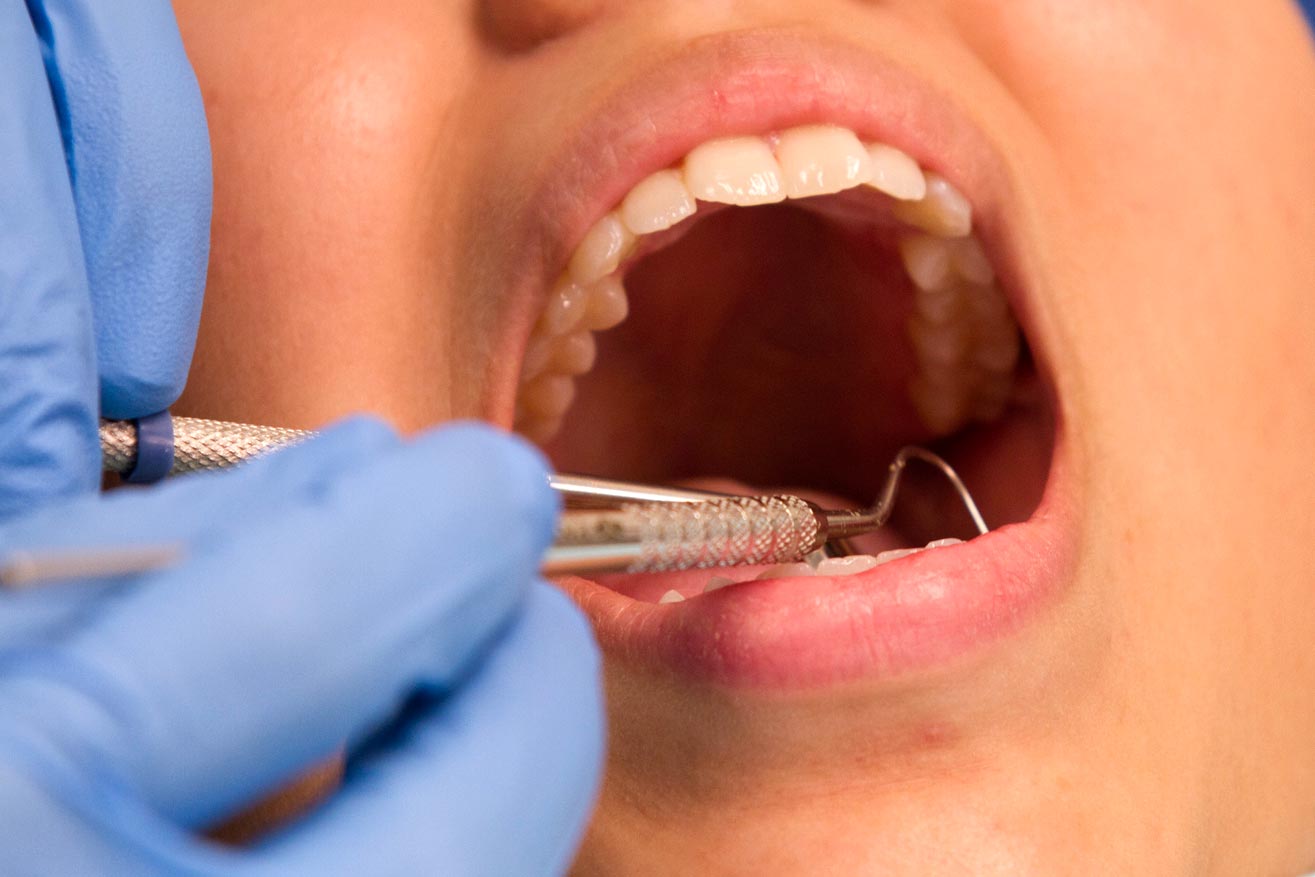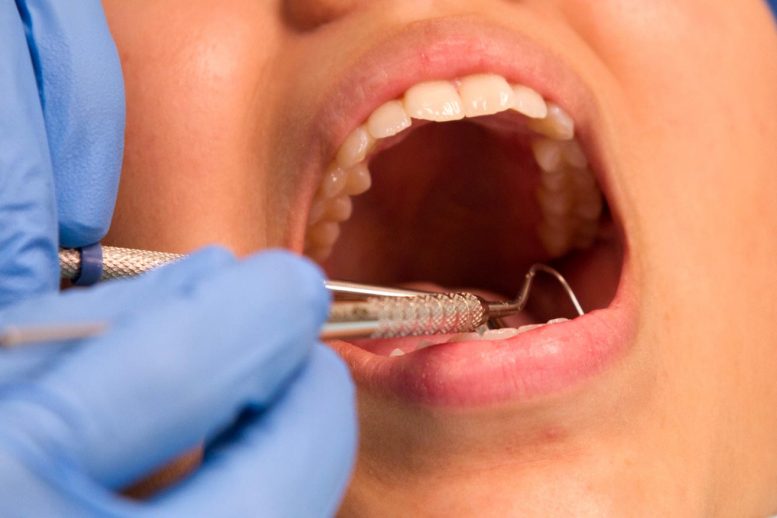Blocking Heart An infection From Mouth Germs With Great Dental Health


Dental test – woman’s mouth. Credit history: Copyright American Heart Association
- Superior oral hygiene and standard dental care are the most vital techniques to lower hazard of a heart infection identified as infective endocarditis caused by microorganisms in the mouth.
- There are four groups of coronary heart sufferers considered to be at optimum risk for adverse outcomes from infective endocarditis, and only these sufferers are recommended to receive preventive antibiotic treatment prior to invasive dental methods.
- American Coronary heart Affiliation tips issued in 2007 proposed not to use antibiotics ahead of certain dental strategies. These tips resulted in a lower in antibiotic use.
Maintenance of superior oral health is additional crucial than use of antibiotics in dental strategies for some coronary heart individuals to stop a coronary heart an infection brought on by germs all around the tooth, in accordance to a new American Heart Association (AHA) scientific statement revealed these days in the association’s flagship journal, Circulation.
Infective endocarditis (IE), also termed bacterial endocarditis, is a heart infection brought on by germs that enter the bloodstream and settle in the heart lining, a heart valve or a blood vessel. It is unusual, but persons with heart valve ailment or former valve surgery, congenital heart disorder or recurrent infective endocarditis have a higher chance of problems if they establish IE. Intravenous drug use also will increase risk for IE. Viridans team streptococcal infective endocarditis (VGS IE) is brought on by microbes that gather in plaque on the tooth floor and bring about swelling and inflammation of the gums. There is been issue that selected dental methods may enhance the hazard of creating VGS IE in susceptible people.
The new steerage affirms former tips that only four classes of heart sufferers must be prescribed antibiotics prior to selected dental techniques to avoid VGS IE owing to their larger possibility for difficulties from the an infection:
- people with prosthetic coronary heart valves or prosthetic product applied for valve mend
- these who have had a previous case of infective endocarditis
- grown ups and little ones with congenital heart illness or
- people today who have been through a heart transplant.
“Scientific info since the 2007 AHA recommendations assistance the check out that minimal use of preventive antibiotics for dental procedures hasn’t amplified instances of endocarditis and is an vital action at combating antibiotic overuse in the populace,” said Walter R. Wilson, M.D., chair of the assertion producing team and a advisor for the Division of Infectious Disorders, Section of Internal Medicine at Mayo Clinic in Rochester, Minn.
It has been above a 10 years since tips for protecting against infective endocarditis were being up to date amid issues of antibiotic resistance due to overprescribing. The American Heart Association’s 2007 pointers, which introduced the most important shift in tips from the Affiliation on the avoidance of infective endocarditis in additional than 50 several years, a lot more tightly defined which sufferers should really get preventive antibiotics right before sure dental strategies to the four superior-possibility classes. This transform resulted in about 90% less patients requiring antibiotics.
The scientific assertion composing group reviewed data on VGS IE because the 2007 guidelines to identify if the guidelines experienced been accepted and adopted, no matter whether conditions of and mortality because of to VGS IE have increased or lowered, and if the assistance could possibly want to be altered.
The crafting committee reviews their comprehensive evaluation of related analysis located:
- There was great standard consciousness of the alterations in the 2007 recommendations, on the other hand, adherence to the tips was variable. There was about a 20% general reduction in prescribing preventive antibiotics amid substantial-chance patients, a 64% lower among the moderate-threat patients, and a 52% reduce in those people sufferers at lower- or unknown-threat.
- In a study of 5,500 dentists in the U.S., 70% claimed prescribing preventive antibiotics to sufferers even though the rules no for a longer period endorse it, and this was most usually for clients with mitral valve prolapse and five other cardiac disorders. The dentists claimed that about 60% of the time the antibiotic regimen was advisable by the patient’s medical doctor, and 1/3 of the time was in accordance to client preference.
- Because the stricter 2007 antibiotic suggestions, there is no convincing proof of an improve in conditions of VGS IE or elevated mortality due to VGS IE.
- The producing team supports the 2007 recommendation that only the greatest chance teams of individuals get antibiotics prior to sure dental processes to support stop VGS IE.
- In the presence of bad oral cleanliness and gingival illness, VGS IE is significantly far more very likely to develop from micro organism attributable to plan each day things to do these as toothbrushing than from a dental course of action.
- Maintenance of good oral cleanliness and frequent accessibility to dental care are thought of as essential in protecting against VGS IE as having antibiotics before particular dental procedures.
- It is critical to join clients with solutions to aid obtain to dental care and assistance with insurance plan for dental coverage, especially in those people sufferers at superior hazard for VGS IE.
- It is nonetheless acceptable to stick to the recommendation to use preventive antibiotics with superior-risk patients undergoing dental methods that involve manipulation of the gum tissue or infected areas of the teeth, or perforation of the membrane lining the mouth.
Reference: “Prevention of Viridans Group Streptococcal Infective Endocarditis: A Scientific Statement From the American Heart Association” by Walter R. Wilson, Michael Gewitz, Peter B. Lockhart, Ann F. Bolger, Daniel C. DeSimone, Dhruv S. Kazi, David J. Couper, Andrea Beaton, Catherine Kilmartin, Jose M. Miro, Craig Sable, Mary Anne Jackson, Larry M. Baddour, and On behalf of the American Coronary heart Association Youthful Hearts Rheumatic Fever, Endocarditis and Kawasaki Sickness Committee of the Council on Lifelong Congenital Heart Illness and Coronary heart Health in the Young Council on Cardiovascular and Stroke Nursing and the Council on Quality of Treatment and Results Exploration, 15 April 2021, Circulation.
DOI: 10.1161/CIR.0000000000000969
The scientific assertion was ready by the volunteer creating committee on behalf of the American Heart Association’s Youthful Hearts Rheumatic Fever, Endocarditis and Kawasaki Sickness Committee the Council on Lifelong Congenital Heart Condition and Coronary heart Health in the Youthful the Council on Cardiovascular and Stroke Nursing and the Council on High quality of Treatment and Results Investigate.
Producing committee customers are Walter R. Wilson, M.D. (chair) Michael Gewitz, M.D., FAHA (vice chair) Peter B. Lockhart, D.D.S. Ann F. Bolger, M.D., FAHA Daniel C. DeSimone, M.D. Dhruv S. Kazi, M.D., M.Sc, M.S., FAHA David S. Couper, Ph.D. Andrea Beaton, M.D. Catherine Kilmartin, B.D.S., D.D.S., M.Sc. Jose M. Miro, M.D. Craig Sable, M.D., FAHA Mary Anne Jackson, M.D. and Larry M. Baddour, M.D. Author disclosures are in the manuscript.








